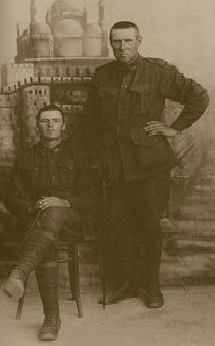Pte
George Edward Curtis
Informationen zu Geburt
|
Geburtsjahr: 1886 |
|
Geburtsort: Busselton, Western Australia, Australia |
Allgemeine Informationen
|
Beruf: Landwirt / Bauman / Ökonom |
Informationen zum Armeedienst
|
Land: Australia |
|
Truppe: Australian Imperial Force |
|
Rang: Private |
|
Dienstnummer: 3805/A |
|
Einberufung datum: 30/11/1915 |
|
Einberufung ort: Blackboy Hill, Western Australia, Australia |
|
Einheiten: — Australian Infantry, 51st Bn. (Letzte bekannte Einheit) |
Informationen zu Tod
|
Sterbedatum: 13/10/1917 |
|
Sterbeort: Daisy Wood, Zonnebeke, Belgien |
|
Todesursache: Im Kampf gefallen |
|
Alter: 31 |
Begräbnisplatz
|
Buttes New British Cemetery, Polygon Wood Grabstelle: VI Reihe: B Grab: 3 |
Auszeichnungen und Orden 2
|
British War Medal Medaille |
|
Victory Medal Medaille |
Punkte von Interesse 3
| #1 | Geburtsort | ||
| #2 | Einberufung ort | ||
| #3 | Ort des Todes (ungefähr) |
Meine Geschichte
Private George Edward Curtis served in the Australian Infantry 51st Battalion, “D” Company, part of the 13th Australian Brigade, of the 4th Australian Division.
On the 12th of October 1917, the 4th Australian Division participated in the First Battle of Passchendaele. It’s task was to guard the flank of the 3rd Australian Division during their attempt to capture the village of Passchendaele. While the 12th Brigade advanced on the 12th of October, the 13th Brigade remained in support.
On the morning of the 12th, volleys of German shell fire crashed into the 51st Battalion’s lines to retaliate for the attack. The shell fire had destroyed the signal line but communication was maintained via front line runners. The Battalion suffered several casualties throughout the day, due to the incessant German shell fire. The First Battle of Passchendaele itself had been an utter failure and the attacking Battalions of the 12th brigade were forced to withdraw to approximately their original positions.
At 5 a.m. on the morning of October 13th it was reported that the 45th Battalion on the left flank was about to withdraw. “C” and “B” Companies were ordered to hold their ground. “D” Company in the 51st Battalion’s support was ordered to reinforce “C” Company on the left flank. No German counterattack developed, but the German artillery kept on shelling the Battalion’s positions, causing heavy casualties. The shelling abated later in the afternoon, but intensified after dusk. During the night “A” and “D” Companies relieved “B” and “C” Companies in the first line, while German machine-gun fire, coming from Busy Wood, swept the line. The Battalion was relieved from the frontline on the following day.
Private George Edward Curtis was killed on the 13th of October 1917, in the aftermath of the First Battle of Passchendaele. He fell in the frontline at Daisy Wood, near the hamlet of Broodseinde, on the right flank of the 51st Battalion. Private George Edward Curtis was buried near the line. After the was his remains were exhumed and interred in Buttes New British Cemetery, Polygon Wood.
On the 12th of October 1917, the 4th Australian Division participated in the First Battle of Passchendaele. It’s task was to guard the flank of the 3rd Australian Division during their attempt to capture the village of Passchendaele. While the 12th Brigade advanced on the 12th of October, the 13th Brigade remained in support.
On the morning of the 12th, volleys of German shell fire crashed into the 51st Battalion’s lines to retaliate for the attack. The shell fire had destroyed the signal line but communication was maintained via front line runners. The Battalion suffered several casualties throughout the day, due to the incessant German shell fire. The First Battle of Passchendaele itself had been an utter failure and the attacking Battalions of the 12th brigade were forced to withdraw to approximately their original positions.
At 5 a.m. on the morning of October 13th it was reported that the 45th Battalion on the left flank was about to withdraw. “C” and “B” Companies were ordered to hold their ground. “D” Company in the 51st Battalion’s support was ordered to reinforce “C” Company on the left flank. No German counterattack developed, but the German artillery kept on shelling the Battalion’s positions, causing heavy casualties. The shelling abated later in the afternoon, but intensified after dusk. During the night “A” and “D” Companies relieved “B” and “C” Companies in the first line, while German machine-gun fire, coming from Busy Wood, swept the line. The Battalion was relieved from the frontline on the following day.
Private George Edward Curtis was killed on the 13th of October 1917, in the aftermath of the First Battle of Passchendaele. He fell in the frontline at Daisy Wood, near the hamlet of Broodseinde, on the right flank of the 51st Battalion. Private George Edward Curtis was buried near the line. After the was his remains were exhumed and interred in Buttes New British Cemetery, Polygon Wood.
Quellen 5
|
51st Australian Infantry Battalion, (Australian War Memorial, Campbell (AWM), AWM4 23/68/20). https://www.awm.gov.au/collection/C1338583 Verwendete Quellen |
|
Australian War Memorial https://www.awm.gov.au/collection/P10329932 Verwendete Quellen |
|
Browning N., For King and Cobbers 51st Battalion A.I.F., (Bassendean, Advance Press, 2007), pg. 180-181. Verwendete Quellen |
|
First Australian Imperial Force Personnel Dossiers, 1914-1920, (National Archives of Australia, Canberra (NAA), B2455, CURTIS G E). https://recordsearch.naa.gov.au/SearchNRetrieve/Interface/SearchScreens/NameSearch.aspx. Verwendete Quellen |
|
McCarthy C., The Third Ypres Passchendaele. The Day-by-Day Account, ( London, Arms & Armour Press, 1995), pg. 113-114. Verwendete Quellen |
Weitere Informationen 4
|
Commonwealth War Graves Commission Database https://www.cwgc.org/find-records/find-war-dead/casualty-details/480179 |
|
Namenlijst (In Flanders Fields Museum) https://namenlijst.org/publicsearch/#/person/_id=bf5b87aa-8c9a-4955-b872-3f2d84df6f64 |
|
Lives of the First World War (Imperial War Museum) https://livesofthefirstworldwar.iwm.org.uk/lifestory/7409812 |
|
The AIF Project (UNSW Canberra) https://aif.adfa.edu.au/showPerson?pid=70392 |
